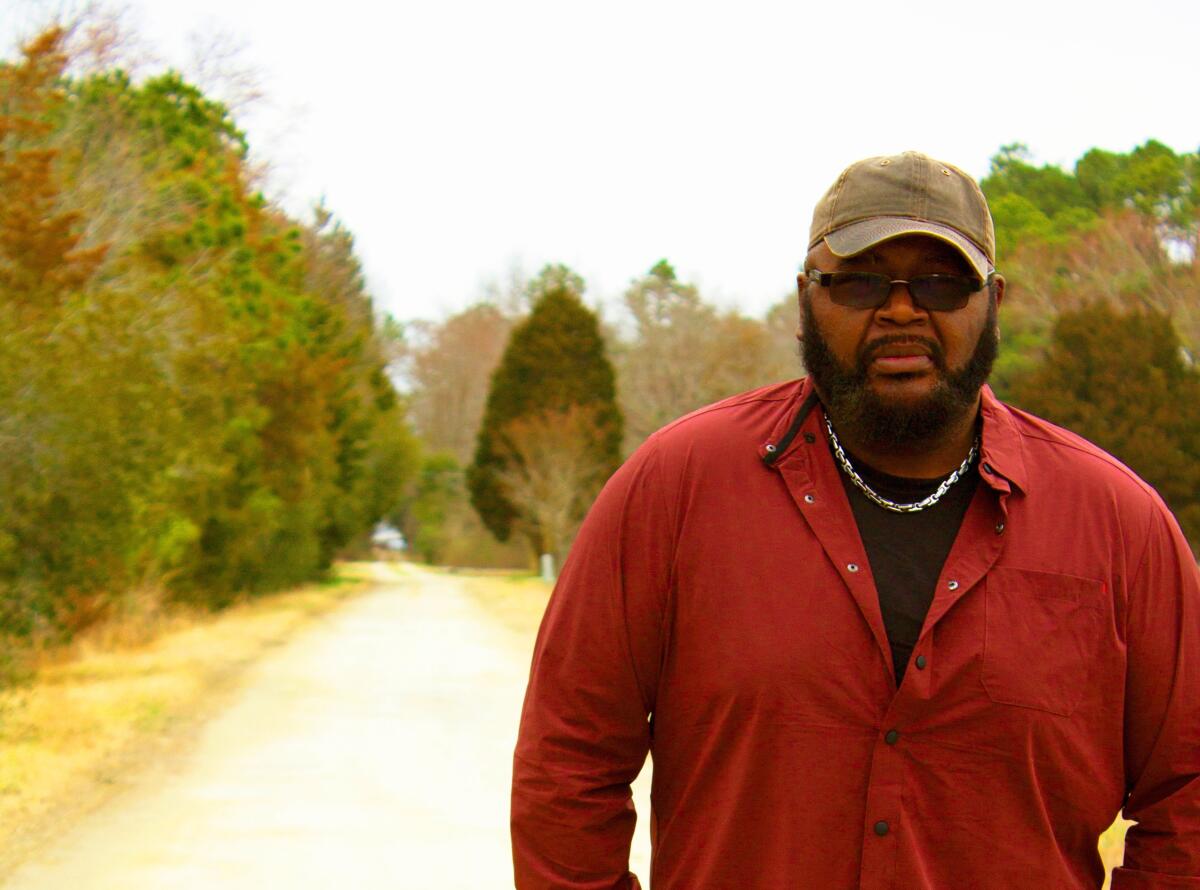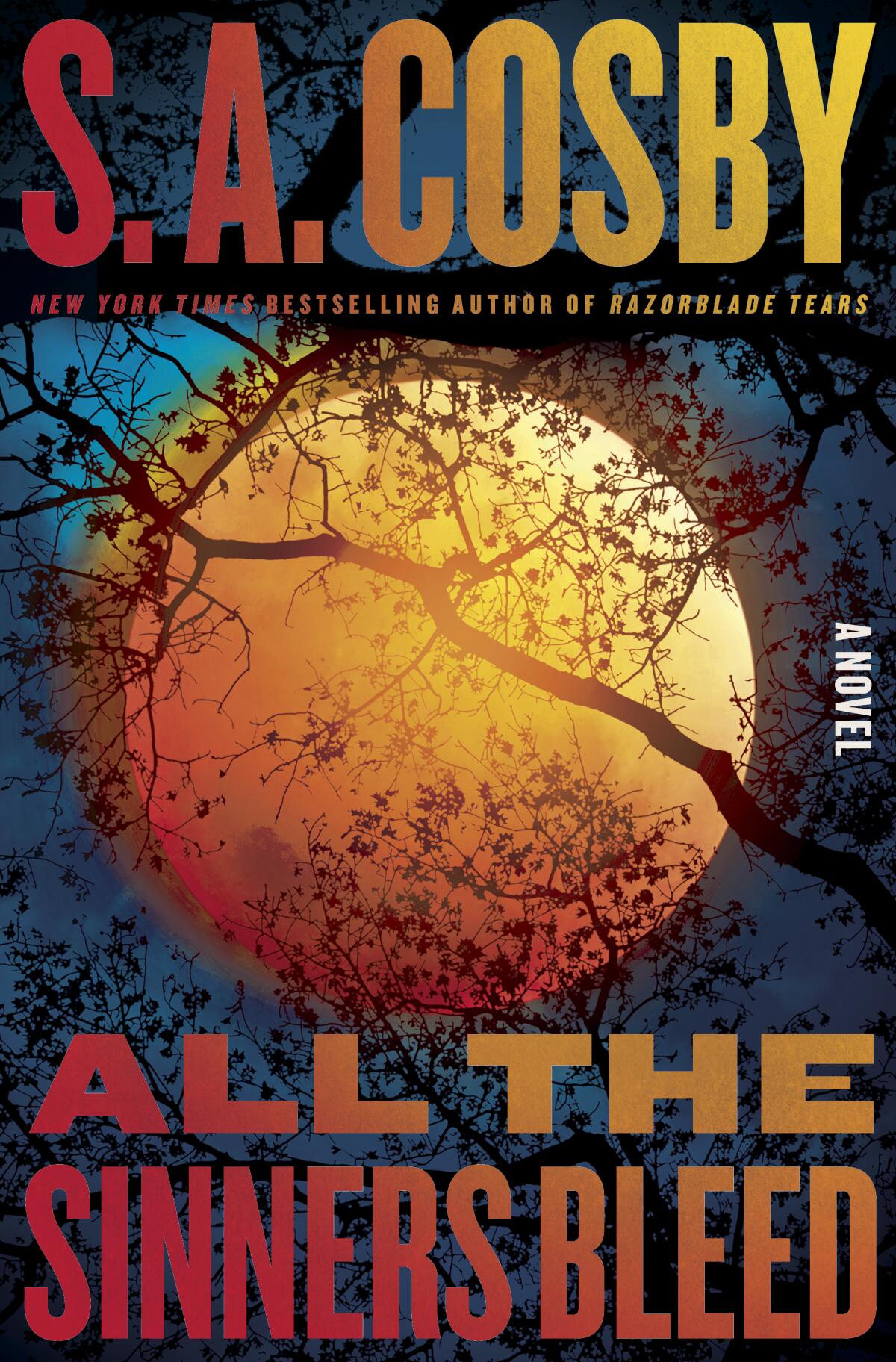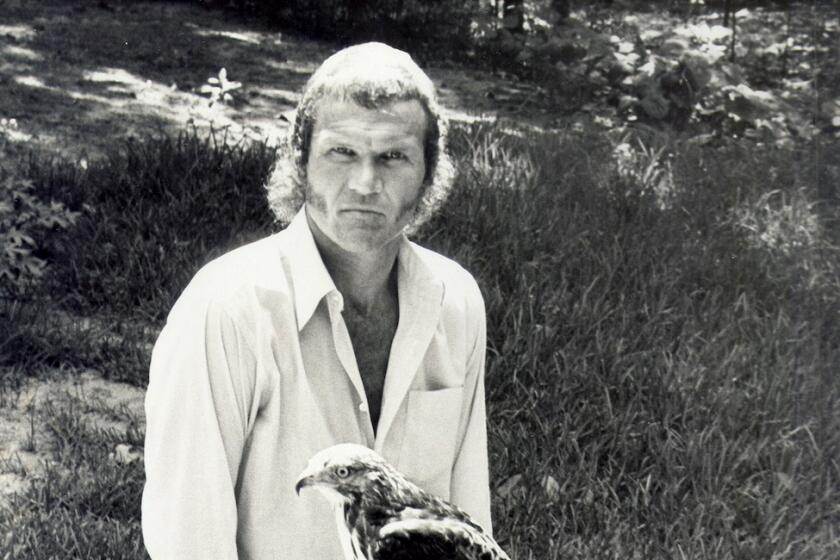Plumbing a town’s racist legacy, Southern noir author S.A. Cosby vaults his own high bar

- Share via
Review
All the Sinners Bleed
By S.A. Cosby
Flatiron: 352 pages, $28
If you buy books linked on our site, The Times may earn a commission from Bookshop.org, whose fees support independent bookstores.
Over just three novels, including “Blacktop Wasteland” and “Razorblade Tears,” S.A. Cosby has thrown back the curtain on Black Southern lives that burn with authenticity amid diverse casts of characters who spill the (sweet) tea about race, sexuality and fatherhood. Cosby’s most memorable protagonists — from car thieves to fathers avenging their sons’ murders — were often acting outside the law after the law had proved inadequate to the task.
Never one to trawl the same waters twice, Cosby plumbs new depths in his latest, “All the Sinners Bleed,” by making its focus a man of the law. Titus Crown, 36, is the first elected Black sheriff in Charon County, Va., a “teardrop-shaped peninsula” on the Chesapeake Bay marked by a dark history: Early 19th century white settlers burned out, then slaughtered the region’s last Indigenous village to assert their “manifest destiny.” Cosby makes clear that the county — named after the mythological Greek who ferried deceased souls over the River Styx — is awash in centuries of violence and mayhem perpetrated during harsh winters and family picnics alike and commemorated at Founders’ Day celebrations in the county square. “These,” Cosby writes, “were the rocks upon which the South was built.”
S.A. Cosby’s “Blacktop Wasteland” stakes out territory in undersung places — and sings too of the complex lives of Black men.
Some 200 years later, one year after our 45th president’s election, Titus is reacclimating to small-town life with his ailing father and a new love interest after a horrific stint with the FBI’s Indiana field office brought him face to face with a level of Christian nationalist violence he’s yet to fully process. But the town won’t let him rest any more than it will let history remain in the past.

Titus and his small team of home-grown deputies are called to a shooting at Jefferson Davis High School. Charon County’s tragedy is notably different from Virginia Tech, Columbine, Sandy Hook or myriad other school shootings on two fronts. For one, the shooter is Black — Latrell Macdonald, the 20-something son of Titus’ high school friend. And Latrell has only one target: a beloved teacher, Jeff Spearman, a white man who taught and nurtured Titus and his friends in the 1990s as well as the current generation of Charon youth.
During a tense, richly detailed standoff between the sheriff’s team and the armed young man, Latrell’s incoherent ramblings about Spearman and Malak al-Mawt (the Quranic angel of death) while holding a wolf mask suggest something stranger is afoot than a run-of-the-mill school shooting. “Check his phone,” Latrell implores Titus. But before Titus can talk Latrell down, two deputies shoot the young man, cutting off the possibility of learning his motive firsthand.
Before their bodies are cold, Latrell’s and Spearman’s deaths set off a maelstrom of public emotions in Charon County. White people label Latrell a cold-blooded drug addict, while a dreadlocked minister and his diverse, progressive congregation focus on a young Black man murdered by racist cops.
Favorite books of S.A. Cosby, author of “Blacktop Wasteland,” feature richly developed characters and reflect how Black lives are affected by systemic racism.
Titus, who brings to the sheriff’s role experience in the bureau’s Behavioral Science Unit, must sift through scant clues at the scene while navigating a racially charged situation framed by the neo-Confederates who chafe at his independence and the Black residents who voted for him but now suspect him of being an Oreo.
Add to the angry chorus Scott Cunningham, chairman of the Board of Supervisors, who likes to think he supervises Titus despite the sheriff being an elected official. Cunningham, scion of a venerable family that practically owns Charon County, put his considerable reputation and money behind Titus’ opponent, Cooter Benning, the previous sheriff’s son, whose election platform Titus sums up as “harass Black and Brown people and anyone who voted Democrat.”
When deputies recover and unlock Spearman’s phone, Titus decides to watch the videos and photos hidden on it in private. The damning evidence, dating back more than a decade, links student and teacher to a string of violence against a number of Black teens, some as young as 13, that is so horrific Titus wants to “Burn the phone. Scald his eyes with hot oil. Put Spearman and Latrell on a pyre and reduce them both to ashes, then scatter those ashes to the four winds.”
The explosive finding, and the presence in the images of a third, masked perpetrator unofficially dubbed the Last Wolf, sets Titus on a quest first to find the victims that leads to an ancient willow near an estate, where remains of seven children are found entwined in the tree’s massive roots. The subsequent investigation to find the Last Wolf ensnares Charon County residents, white and Black, and uncovers abuse, corruption and more.
Why did Penguin decide to reissue a memoir and a novel by Harry Crews, a dead white Southern writer? His influence — and his truths — run deep.
Cosby does a superior job sketching the county’s various actors and suspects, from wealthy town fathers and mothers to the neo-Confederates — Cosby’s term for the Civil War apologists marching to protect a statue of a beloved rebel hero. Everyone has something to say or something to hide — truck drivers, meth dealers, soul-food restaurateurs, preachers of all faiths and even members of Titus’ team. But Titus’ driving point of view reveals the layers of complexity that can be divined by a Black cop policing a small Southern town, an educated man who reflects as easily on Flannery O’Connor’s observation that the South is Christ-haunted as he does on the earthier wisdom of his long-deceased mother, whose voice guides his steps as surely as her death burdens his guilty heart.
By the time the hunt for the Last Wolf culminates at a climactic Fall Festival, complete with a showdown between racist and progressive residents, readers will feel the full force of the currents pulling apart these divergent communities. And while there are more twists and bends that fall back on Cosby’s sometimes overused skills in depicting physical mayhem, it is the root causes and consequences of that violence that make “All the Sinners Bleed” his most deeply resonant, timely and timeless novel to date.
Woods is a book critic, editor of anthologies and author of the Det. Charlotte Justice mysteries.
More to Read
Sign up for our Book Club newsletter
Get the latest news, events and more from the Los Angeles Times Book Club, and help us get L.A. reading and talking.
You may occasionally receive promotional content from the Los Angeles Times.









